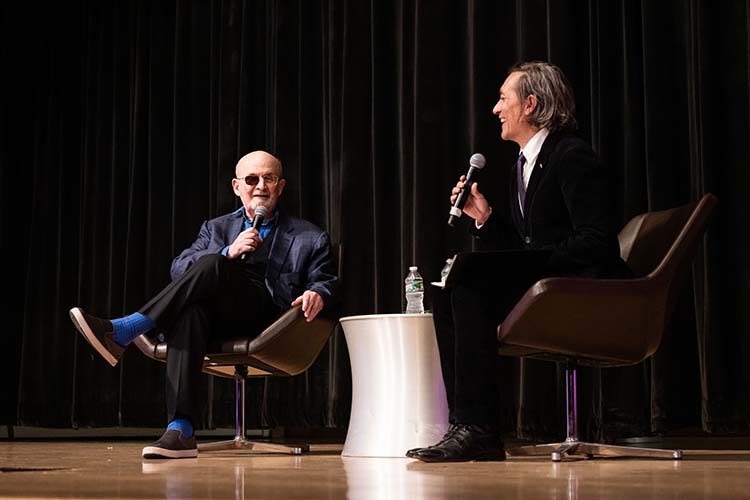
The New School for Social Research’s 2025 Phillips Lecture Featured Acclaimed Writer Salman Rushdie
The acclaimed author Salman Rushdie recently came to The New School to deliver the 2025 William Phillips lecture, a talk titled “Blasphemy Is a Victimless Crime.” Rushdie is the author of 22 novels including Midnight’s Children (a Booker Prize winner), The Satanic Verses, Shame, The Moor’s Last Sigh, and Quichotte;the short story collection East, West; the memoir The Jaguar Smile; three collections of essays; and other works. The talk was followed by a discussion with Luis Jaramillo, an assistant professor of writing, that covered a wide range of topics, including creatives’ sources of inspiration, the reason religion is a recurring feature in Rushdie’s work, and the prophetic qualities of good novels.
The Phillips Lecture was launched in 2006 with a talk by Cynthia Ozick. Other lecturers include the writers Norman Manea and Olga Tokarczuk, the sociologists Peter Berger and Daniel Dayan, the journalist Masha Gessen, the historian Andrew Delbanco, and the psychologist Nancy Cantor. The series was founded to further the legacy of William Phillips—co-founder of Partisan Review, a journal committed to freedom of thought in literature, creative expression, and serious, open debate—by Edith Kurzweil, PhD Sociology, a member of NSSR’s board of governors, an editor of Partisan Review, and Phillips’ wife.
Rushdie’s talk took its name from a gift given to him by a reader. “This phrase was written on a T-shirt I was sent by an anonymous well wisher during the furor over The Satanic Verses. Where there is no belief, there is no blasphemy, because there’s nothing to blaspheme against. There are, of course, people who would disagree with this view.”
The concept of blasphemy has played a central role in Rushdie’s life. His early novel The Satanic Verses was banned in more than 20 countries and sparked an attempted prosecution for blasphemy in the United Kingdom. “I was living in England at the time of the fuss about The Satanic Verses. The last successful prosecution of blasphemy in the UK was in 1976. In a magazine called Gay News, the poet James Kirkup wrote a poem about the crucifixion of Christ, imagining a gay centurion at the foot of the cross fantasizing about the body of Christ. A campaigner, Mary Whitehouse, who would campaign against what she considered to be moral issues, especially against anything to do with sex, was given permission to bring a private prosecution against Gay News for its publication of this poem. They were found guilty; the verdict was reversed later. It was the last time in British law that the crime of blasphemy was found to have been committed.
“When the attack on The Satanic Verses began, the people attacking the book in the UK used the Kirkup case to say that I should be prosecuted and found guilty in the same way. The only reason I was not found guilty, given that the law was still on the books, is that the law only protected the Church of England. Unfair, right? Which is what they pointed out. The solution to the problem was not to extend the law, which is what was being asked for, but to diminish the law. It took a few years, but eventually in the UK, the law against blasphemy was abolished.”
Later, during his discussion with Jaramillo, Rushdie explained how his beliefs, observations, and background combine to shape his writing. In response to Jaramillo’s comment that Rushdie, along with other fiction writers, sometimes seems to predict the future, Rushdie said, “What a book does at its best is provide a vision of the world that the reader accepts, and sometimes it’s a little ahead of the curve. Sometimes the vision of the world that it sees comes into being a little later. Good or bad. A lot of writing is just intensely paying attention, and if you do that, sometimes you see things before other people see them. Then it looks like, how did you know that? I knew that because I was paying attention.”
The two also discussed why religion appears so frequently in Rushdie’s work, even though he is not a religious person. “I guess religion creeps in because of where I live. You may not be religious, but everyone else is, so if you try to write about that world, you have to deal with it. Otherwise your characters don’t make sense. You have to be able to write about people who think in a way you don’t think. Strange thing is when I wrote The Satanic Verses, I thought I was writing a novel about London. The idea was to write a London novel. One of the things about London is there’s an immigrant South Asian community, so the novel took place in that community.”
The writers also discussed where creative inspiration comes from, with Jaramillo expressing curiosity about what Rushdie feels about the concept of the muse if there is no god. Rushdie responded, “Very often in the act of writing, you have that feeling of something being written through you, not by you. I don’t know what that means, but I’m excited when it happens. It doesn’t happen every day, but when it does happen you think, ‘Oh, how did I write that?’ You find yourself writing sentences that you have never thought, having people express opinions which you have never had. This stuff comes out of you from somewhere. I guess this is the magic of magical realism, there is a magic in art. Art is a mystery, and thank goodness it is. If it wasn’t a mystery, it would just be ordinary.”